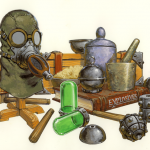Having successfully rage-quit my first ironman run through XCOM: Enemy Unknown (dear God, the casualties and missteps!) and completed a full run-through, I’m still looking forward to another run through this highly-addictive exercise in sado-masochism. A couple of things I’ve picked up, mostly the hard way:
Author Archives: Burrowowl
X-COM Squad Strategy
Looking forward to the unlocking my preload of XCOM: Enemy Unknown this evening, my thoughts keep wandering to what exactly I intend for my approach to be early on. With a limited number of troopers available for each ground mission, one temptation will be to expand the number I can deploy by upgrading my base to allow for five- or six-man squads. Depending on the other options available at the moment, compared to my budget, that will be a strong temptation indeed.
Developing some basic body armor and support capabilities in the form of decent medical kits will be another early priority, presuming that I find my troopers’ weapons to be sufficiently deadly. In the original X-Com the conventional armaments were laughable, so I’ll be sorely temped to research and manufacture laser weapons. I’m leaning toward the defensive, though, as a shoddy weapon in the hands of a veteran is preferable to an excellent weapon held by a panic-prone rookie. I hope.
As for those rookies, as soon as I’ve got a squad worth of veterans, there will be a rotation of fresh meat on every mission I can swing it for. I know at some point a valuable, experienced lynchpin of my tactics is going to get himself poisoned or burned or blasted all to hell, and end up spending quality time in the hospital or pushing up daisies. Just having one good sniper or heavy or support guy isn’t a good option; it’s a recipe for long-term disaster. So somebody’s going to have to ride the bench every mission. Sometimes getting laid up with an injury will make this decision easy, but other times it’ll be painful. As rookies get promoted and find their role, their place in the rotation will shift.
Once I’ve got a stable of modestly-experienced troopers available, I figure I’ll go half-and-half with hard-bitten veterans and the lower ranks. Nobody is really expendable, but I’d much rather take the hard-nosed position of sending a corporal in first instead of a major or colonel.
When I have enough experienced troopers to fill out two full squads, it is time to expand squad size. The 1994 X-Com saw enough Normandy Beach effect, with rookies dying in droves as they exited their Skyranger. No need to repeat that more than absolutely necessary.
Squad composition will go balanced for a while, with a Sniper, Support, Assault, and Heavy Weapons specialist in the mix whenever I have them available, swapping out the Assault and Heavy Weapons troopers for rookies more often than not. I expect a lot of Assault specialist casualties early on. For early play I hope that a barely-competent Heavy Weapons guy will get his job done more often than not; he’s for clearing out walls, right? I hope to get a Support specialist early on and keep him on a road of continuous improvement. This role strikes me as particularly conducive to my cautious-advance style of play from the old days.
In a couple days, with any luck, it’ll turn out this is a good approach. Unfortunately luck seems to swing both ways in the X-Com world.
Careers in the IKRPG
The new Iron Kingdoms Roleplaying Game system has been out for a couple of weeks, so it’s high time we take a look at character creation options. A striking feature of the process is that each player character has two starting careers, and can pick up more as his adventuring life runs on. So which careers to pick? Some appear to compliment each other nicely, but with all your skill and ability choices limited by per-career lists, you run a serious risk of making somebody that’s totally worthless in a scrap or completely helpless outside a fight.
To help mitigate this, the following technique can be applied to each career you are considering. Plot out your careers on two axes, Urban vs. Wilderness and Combat vs. Skills. If your GM wants to run a combat-intensive urban campaign, you would be well-served to lean towards a career combination that suits. Such a character may be a boat-anchor in a wilderness skilled campaign.
The Procedure: Keep two running tallies, one for Urban, one for Combat. Add five to the Urban tally for every starting ability, connection, or skill that is clearly urban, subtract five for those that are clearly not. Many don’t fit neatly, so don’t apply any number for those. For abilities, connections, and skills available through advancement, add or subtract four for every ability or connection. The values are ten for any skill capped at four, five for any skill capped at three, one for any skill capped at two. Repeat for Combat but add five for each spell the career starts with (spellcasters are for killing stuff in this setting, mostly).
As and example, take the Alchemist’s Combat axis:
- +10 Combat for starting abilities
- +10 Combat for starting military skills.
- -10 Combat for starting occupational skills.
- +16 Combat for advancement abilities.
- -4 Combat for advancement connections.
- +12 Combat for advancement military skills.
- -61 Combat for advancement occupational skills.
- Total of -27 Combat. The Alchemist is mostly a skilled career.
Now for the Urban axis:
- +0 Urban for starting abilities.
- +5 Urban for starting skills.
- +4 Urban for advancement connections.
- +41 Urban for advancement skills
- Total of +50 Urban. There’s nothing inherently outdoorsy about being an Alchemist.
Contrast this with the Ranger:
- +10 Combat for starting abilities
- +10 Combat for starting military skills.
- -20 Combat for starting occupational skills.
- +36 Combat for advancement abilities
- +42 Combat for advancement military skills.
- -61 Combat for advancement occupational skills.
- -10 Urban for starting abilities.
- -10 Urban for starting skills.
- -32 Urban for advancement abilities.
- -39 Urban for advancement skills
- Total of 17 Combat. The Ranger has a lot of skills and a lot of fighting prowess
- Total of -91 Urban. This career is built for the wild places between cities.
Theoretically if you were to make a character that is an Alchemist/Ranger you add these scores together for a -10 Combat / -41 Urban character that is probably better suited for a wilderness campaign with a mix of fighting and skill play than for a combat-heavy urban campaign.
Of course, this is highly-generalized and a great deal of the point totals come from choices available to the character as he gains experience. An Alchemist/Ranger that keeps picking up skills from the Alchemist career has he advances is going to be much more urban, and depending on the abilities selected during advancement there’s a lot of room to become something of a walking calamity in combat.


